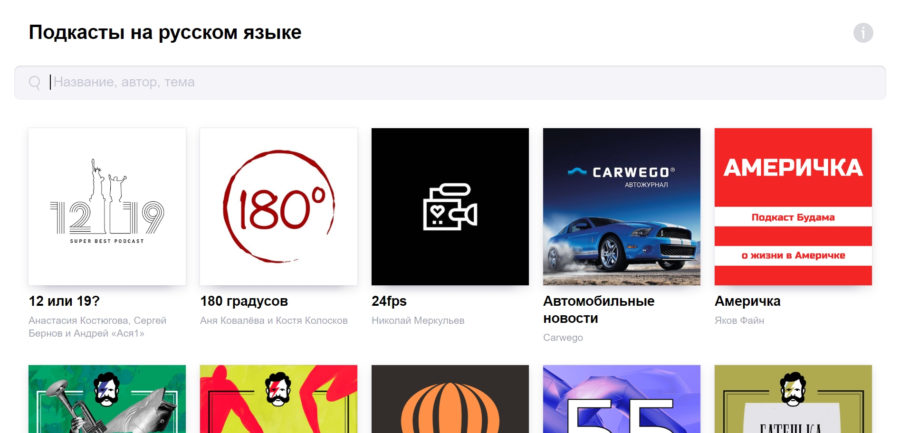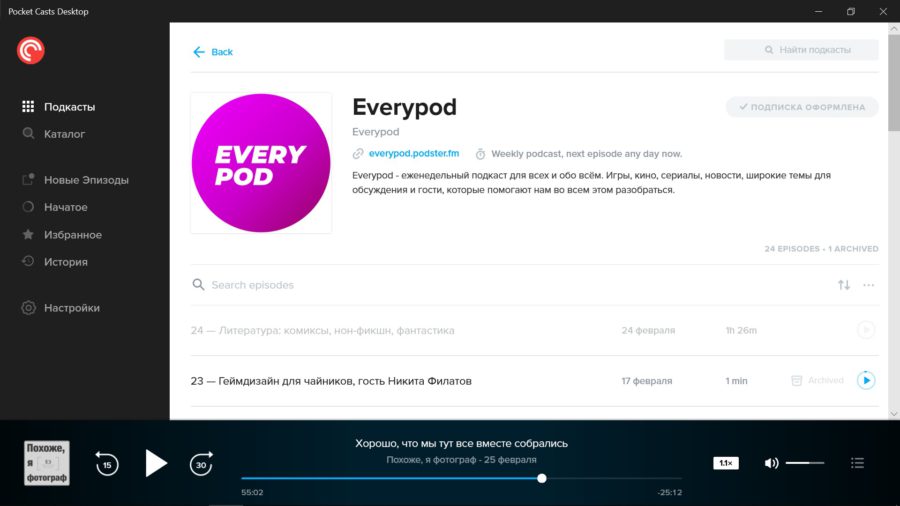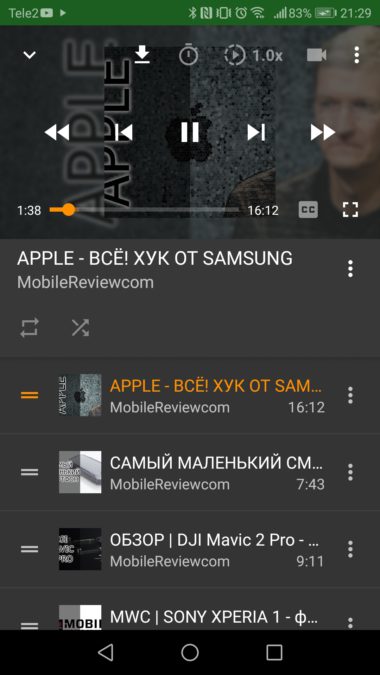Podcasts are modern radio. This phenomenon is difficult to call new, because podcasts became popular back in 2004 along with the iPod player. The word 'podcast' itself is derived from the name of the player Apple.
Podcasts are easiest to think of as radio broadcasts – there is a title, a set of presenters, a topic and frequency. The nuance is that anyone with a microphone and a computer can launch their podcast. Therefore, sometimes podcasts are approached unprofessionally, the sound quality and the stability of new episodes can suffer from this.
Why podcasts are so special
Podcasts are not meant to replace articles or videos – they are only alternatives. You can listen to the podcast on the go on your way home or to work, in transport, in line, or while washing dishes. For example, I almost stopped listening to music and switched to podcasts.

For me, a big plus is that I can walk around listening to a podcast in one earpiece and at the same time hear the whole environment, and in music, the stereo effect is important. Some people listen to podcasts in the background during monotonous work.
Podcasts are just a way to consume information. You just need to find an interesting topic for yourself.
Why pay attention to it
The question arises – why would someone waste their time telling something into a microphone, and who will listen to it. Everything in order.
First, for many, podcasting is a hobby and a way to share your opinion, talk about something, or discuss with others. You can start a blog and write everything in text, but there are podcasts where people talk. In addition, several people can participate in a podcast at once, and it is more difficult to organize a conversation in the text.

Comedian Joe Rogan is one of the most famous podcasters in the United States, guests like Elon Musk come to him
Secondly, we learned how to make money on podcasts. On the foreign Internet, they have long become a separate type of media – this is a full-fledged market with large players, advertising and earnings. In the Russian-speaking segment, monetization is going slower, but there are already examples. In March, Meduza released a branded podcast episode sponsored by a major sportswear brand. Another popular service among podcasts is the 'Patreon' service – listeners can thank the authors by subscribing to a monthly subscription from one dollar. Usually, for this, subscribers receive bonuses and exclusive materials.
Third, there is a demand for podcasts. The number of streams of the most popular podcasts cannot be compared to the views of famous bloggers on YouTube, but this market is gradually growing – large companies and media have already taken notice. For example, VKontakte and Yandex.Music have launched a special section for this, and RIA Novosti is already releasing a whole series of podcasts.
What to listen to
According to my observations, the boom of podcasts on the Russian-speaking Internet has occurred in the last two years. During this time, I discovered four new podcasts that I now listen to all the time. I will briefly tell you about them:
KuJi Podcast. The two hosts are stand-up comedian Timur Karginov and the creator of the popular science site N + 1 Andrey Konyaev. They call interesting guests and talk about any topic. I advise you to listen to an issue with journalist Olesya Gerasimenko about wedding loans and addicted to sports betting.

KuJi comes out as a YouTube video but can be listened to as a podcast
Crete Mouse. Author Alexander Golovin promotes critical thinking and discusses scientific and pseudo-scientific topics with guests. I advise you to listen to episode 29 of 'Medicine that is not needed' about misconceptions in medicine and useless drugs.
Talking head. Tales from a former crime reporter and current private investigator, at least that's what he calls himself. These are short, interesting, funny and sometimes creepy stories from Peter's life. You can listen to any episode.
Everypod. A podcast about the modern world and popular culture, but not only about games, films, TV shows. There are issues about tabletop role-playing games, stand-up and philosophy.

russiancast.club
In mid-February, Den Talala, author of Podcast Showroom, launched the russiancast.club website, where he collects all Russian podcasts. There is a search by title, topic and author. For each podcast, you can see the description, the average length of the episode, and get links to listen to. The list is just growing, but this is still the most convenient option for those who are familiar with podcasts.
I would also like to recommend these podcasts from myself: Mobile-Review, Zavtracast, 'Tinkoff-Journal', Hobby Talks, 'It happened so', 'How is it in Russian', BeardyCast, 'Radio-T' and lectures by Arzamas.
How to listen
Podcasts have become popular thanks to Apple, so there is no problem with their devices. iOS has a built-in 'Podcasts' app and is also included in iTunes for macOS. There is no standard way in Android, but the Google Podcasts app was released last year – it's free and constantly updated. You can't even add a new podcast by URL, but it's enough to get you acquainted.

Pocket Casts for Windows
With Windows everything is more complicated. There are tons of podcast players in the Windows Store, so this shouldn't be a problem, it's more difficult to sync the process with your smartphone. In conjunction with iPhone, you can download iTunes to your computer and listen to podcasts through it, but there will be no synchronization with Android. I use Pocket Casts, but the app is paid and expensive – 299 rubles. on the phone and 575 rubles. for the PC version.
Active VKonakte users can listen to podcasts directly on social networks – there are many of them. Yandex.Music also has a section for lectures and podcasts, but it is still in beta.
Some podcasts are released on YouTube and in general there are many videos that you can listen to without a picture. Subscribing to YouTube Premium helps me with this, with it on your smartphone you can play videos in the background and save them to memory. I pay to subscribe to Google Play Music and it comes with 'premium' features for YouTube, so that's not a problem for me.
If you do not have the ability or desire to pay money to YouTube, then I can recommend the YMusic app. It allows you to run videos in the background and download them to your smartphone's memory, but it doesn't work as conveniently as the official app. For obvious reasons, you will not find this application on Google Play, you will have to install it via the apk file.
That's all. Listen to podcasts and share them with others. I suggest sharing interesting podcasts and players for different systems in the comments, the situation with Windows is especially interesting.


